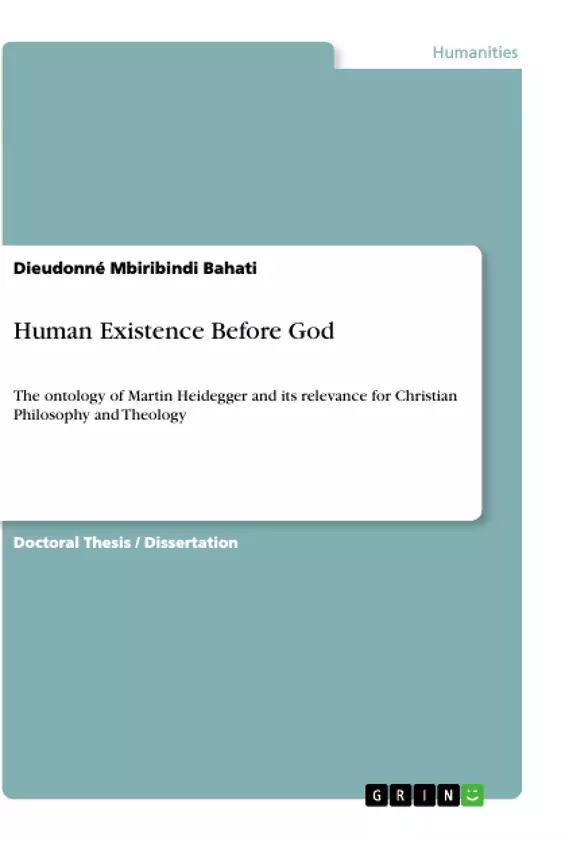In our study, we do not just demonstrate that the analysis of Dasein, in the philosophical project of the first Heidegger was necessary and prior to the understanding of the question of the meaning of being, but also we explained, in the other section of our research that the philosophical project of the second Heidegger regarding the question of the meaning of being intended to demonstrate that there is a relationship between Dasein and God, a relationship which connects the question of the meaning of being not just to the truth of being, through das Ereignis but also to the event of the poetic God, in the light of the being-Die Lichtung des Seins. This new understanding of the development of the philosophy of Martin Heidegger offers a possibility to systematize the relationship between philosophy and theology in the thinking of Martin Heidegger. On one hand, we explained that no one can deny the theological origin of Martin Heidegger and his theological affiliations. On the other hand, we also showed how throughout his life, Heidegger reacted against a theology that is too philosophically influenced and wanted to make clear that his thinking should be either theistic or atheistic and never both at the same time. It has to be a discourse about God which is not the return to the old onto-theology but it requires that one constructs a more poetic discourse about God and attempts to interpret the divine and the sacred not as God as such but as names that one uses to refer to God.
This poetic discourse, however, has some relevancies in a Christian tradition, especially if one looks at the concept of revelation of the undescribed Last God which is close to the understanding of revelation in the Christian tradition.
The second part of our study tried to ask the question of being but in a new perspective, according to the method of transcendental philosophy. We have emphasized how indeed, there is a link between the existential phenomenology of Martin Heidegger and the research in neo-scholastic ( Joseph Maréchal, J.B. Lotz, K. Rahner and Emerich Coreth, Otto Muck, all Jesuits Fathers) thought about the question of being as the foundation of beings, as the foundation of what is there. It is a sort of a further development of the ontology of Heidegger in the perspective of Christian philosophy and theology.
Inhaltsverzeichnis (Table of Contents)
- Introduction
- The Concept of Existence in Heidegger's Philosophy
- The Ontological Turn in Heidegger
- The Fundamental Ontology of Being and Time
- Existence and Time: The Temporality of Being
- The Relevance of Heidegger's Ontology for Christian Philosophy and Theology
- Heidegger's Ontology and the Question of God
- The Problem of Religious Language in Heidegger
- Heidegger's Thought and the Possibility of a Christian Ontology
- Heidegger and the Tradition of Christian Thought
- The Influence of Aquinas and the Thomistic Tradition
- The Impact of German Idealism and Phenomenology
- Heidegger's Relationship to the "New Scholastic Philosophy"
- Conclusion
Zielsetzung und Themenschwerpunkte (Objectives and Key Themes)
This book aims to explore the ontology of Martin Heidegger and its relevance for Christian philosophy and theology. It examines Heidegger's key concepts, such as existence, time, and being, and analyzes their implications for understanding the relationship between human existence and the divine. The work seeks to contribute to the contemporary debate about the meaning of Heidegger's thought for Christianity.
- The ontology of Martin Heidegger
- The relevance of Heidegger's ontology for Christian philosophy and theology
- The relationship between human existence and the divine
- The possibility of a Christian ontology
- The influence of Heidegger on contemporary Christian thought
Zusammenfassung der Kapitel (Chapter Summaries)
The first chapter introduces the concept of existence in Heidegger's philosophy, outlining his ontological turn and the fundamental ontology of Being and Time. It explores the temporality of being and the relationship between existence and time.
The second chapter examines the relevance of Heidegger's ontology for Christian philosophy and theology, addressing the question of God and the problem of religious language in Heidegger's thought. It explores the possibility of a Christian ontology based on Heidegger's concepts.
The third chapter discusses Heidegger's relationship to the tradition of Christian thought, analyzing the influence of Aquinas and the Thomistic tradition, the impact of German Idealism and Phenomenology, and Heidegger's connection to the "New Scholastic Philosophy."
Schlüsselwörter (Keywords)
Key terms and concepts include: Martin Heidegger, ontology, existence, time, being, Christian philosophy, Christian theology, religious language, "New Scholastic Philosophy," German Idealism, Phenomenology, Aquinas, Thomistic tradition.
Frequently Asked Questions
What is the relationship between Heidegger's Dasein and God?
The book explores how Heidegger's later philosophy connects the question of the meaning of being to the event of a "poetic God."
How does Heidegger's ontology influence Christian theology?
The work examines the relevance of concepts like existence and time for understanding the divine and the possibility of a Christian ontology.
What is "New Scholastic Philosophy" in this context?
It refers to neo-scholastic thinkers like Karl Rahner and Joseph Maréchal who linked Heidegger's phenomenology with Christian thought.
Did Heidegger consider his thinking theistic or atheistic?
Heidegger reacted against philosophically influenced theology, stating his thinking should be clearly one or the other, but never both simultaneously.
What is the "poetic discourse" about God?
It is an attempt to interpret the divine and sacred through names and language that avoid traditional onto-theology.
- Citation du texte
- Dieudonné Mbiribindi Bahati (Auteur), 2019, Human Existence Before God, Munich, GRIN Verlag, https://www.grin.com/document/922926



